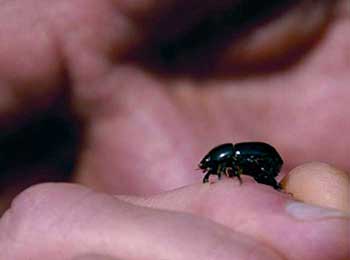Black beetle warning
 Another mild winter could result in a population explosion of black beetles on Waikato pastures, warns AgResearch scientists.
Another mild winter could result in a population explosion of black beetles on Waikato pastures, warns AgResearch scientists.
A black beetle field day was recently held on Martin Henton’s farm in Taupiri.
His property was hit very hard in the last black beetle outbreak in 2007-2010 and since then the pest has persisted at higher levels than on many other farms.
Martin is part of the Waikato Black Beetle Action Group who obtained Sustainable Farming Fund investment for the project ‘Beating black beetle: developing pest-resistant dairy pastures in the Waikato.’
AgResearch has used his farm for a number of project trials as a result.
Black beetle populations are on the increase and development is more advanced this Autumn than in the previous five years, said AgResearch Science team leader biocontrol and biosecurity Dr Alison Popay.
“This means that the adult black beetles will have plenty of time to feed and build up fat reserves to help them through the winter. If warm conditions continue through autumn and spring conditions are right, some farmers could be facing another serious black beetle outbreak next summer.”
A model has been developed that should give farmers more advance warning of outbreaks.
“The model predicts that if it’s warm and dry again in the next spring-summer period, we will be heading for trouble and there would be huge problems if this continued into 2016,” says Dr Popay.
“NIWA is predicting about 50% chance of an El Niño event July – September. While Waikato farmers may not like the cold wet conditions it may bring, it should help reduce overwintering black beetle adult populations.”
Farmers can make decisions now that will prepare their farm for the likely black beetle outbreak if winter is warmer and drier than average.
“When renovating this autumn, use a black beetle-active endophyte and manage pastures to ensure no gaps develop where beetle-friendly paspalum and summer grasses can establish. Establish endophyte pasture now to ensure it will be robust enough next summer when pressure from the black beetle increases.
“Legumes are not attacked by black beetle. Also consider crops like chicory, which are not a good host for black beetle and can help break the pests’ lifecycle.”
One trial on Martin Henton’s and fellow action group member Stu King’s properties is investigating the possible benefits of liming in reducing black beetle populations.
“It is too early to give definitive recommendations from the lime trial other than to say low soil pH appears to favour black beetle and getting soil pH into the optimum range for your soil type will help pasture production and quality,” says Dr Popay.
Click this link for a story written for the Waikato Times by Number 8 Network’s Annette Taylor.
Further information about the black beetle can be found here. Pestweb is the directory of New Zealand’s most damaging pests and weeds.


